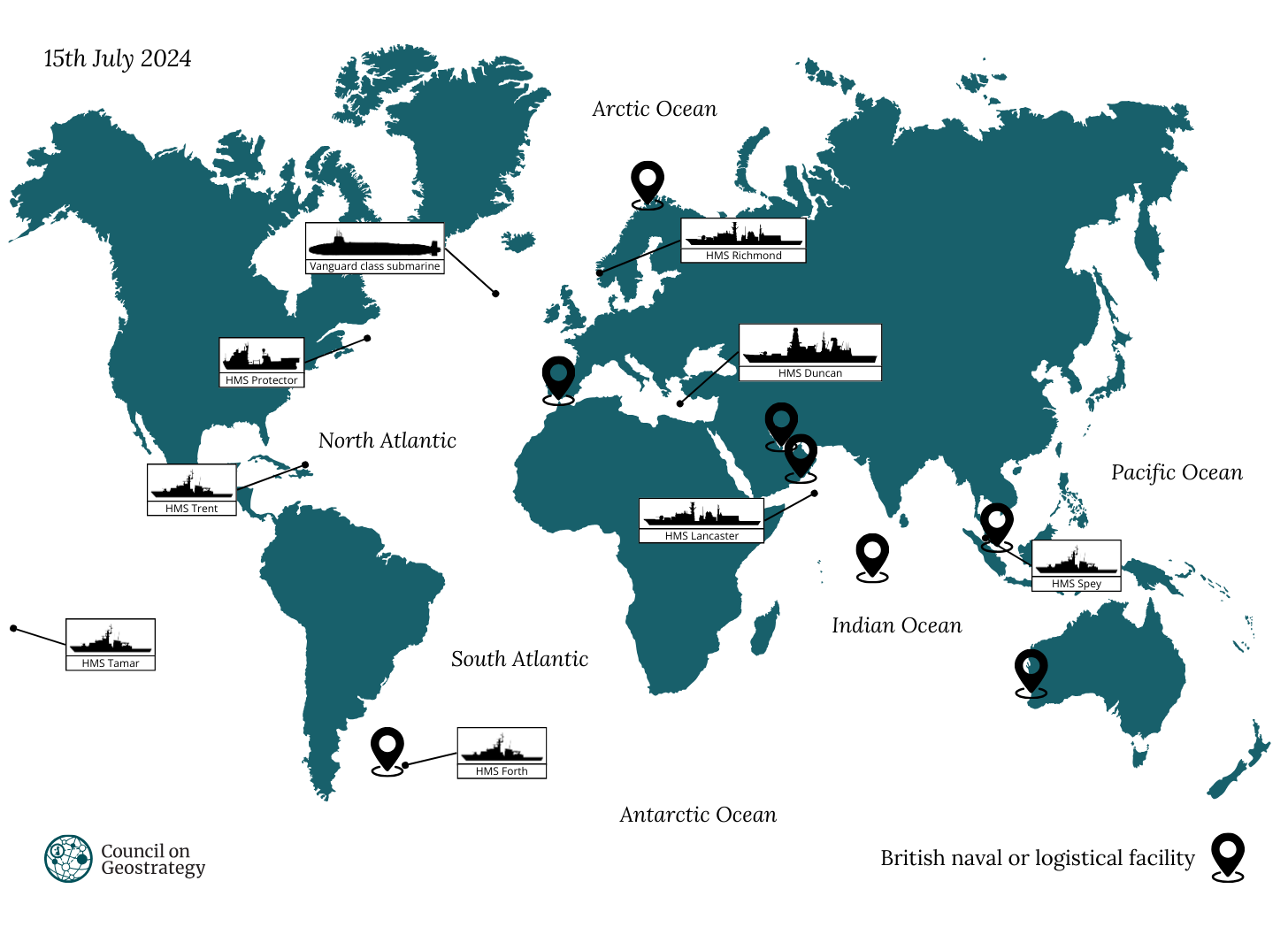Welcome to the second Cable, our weekly roundup of British foreign and defence policy.
From a domestic triumph to an international summit! Sir Keir Starmer’s international debut as British prime minister came to a close with his attendance at the North Atlantic Treaty Organisation’s (NATO) 75th anniversary summit in Washington last week. There, Starmer mingled with leaders of key allies to discuss enhancing the alliance’s collective security and strengthening partnerships with non-NATO allies, including Ukraine.
There, Starmer met with Volodymyr Zelenskyy, President of Ukraine, where he informed him that the Ukrainian Armed Forces can use the United Kingdom’s (UK) lethal Storm Shadow cruise missiles to strike targets within Russia. This statement underscores the Labour government’s ongoing commitment to prioritise support for Kyiv, especially following Healey’s announcement of additional military aid during his recent trip to Odesa.
While the new government signals that the Euro-Atlantic is the focal point of British defence, it remains committed to the Indo-Pacific. In a meeting between Starmer and Yoon Suk Yeol, President of South Korea, both leaders agreed that NATO and Indo-Pacific countries should work closely together due to the ‘indivisibility’ of Euro-Atlantic and Indo-Pacific security. This was reflected by the fact that leaders from Australia, South Korea, New Zealand and Japan attended the NATO summit.
Meanwhile, the Washington Summit Declaration, which has British fingers all over it, pointed to the growing linkages between Russia and the People’s Republic of China (PRC):
The PRC continues to pose systemic challenges to Euro-Atlantic security…The PRC has become a decisive enabler of Russia’s war against Ukraine through its so-called “no limits” partnership and its large-scale support for Russia’s defence industrial base.
This week, the new government is expected to launch a Strategic Defence Review to appraise British defences.
The UK will also host the European Political Community (EPC) summit at Blenheim Palace on 18th July. The summit will bring together approximately 50 leaders from across Europe to discuss shared challenges such as Russia’s ongoing war against Ukraine and illegal migration. Following Lammy’s recent announcement that the Labour government wishes to ‘reset’ Britain’s relations with Europe ‘as a reliable partner, a dependable ally and a good neighbour’, the EPC summit will provide a fitting platform for it to convene and align European allies and partners behind British objectives.
How Britain is seen overseas
After the election comes the serious business of policy analysis. With the current geopolitical climate, think tanks, universities and parliamentary research services are digesting what impact the new British government will have in relation to international security.
The Council on Foreign Relations released a brief looking into the expected foreign policy of a new Labour government. It notes that Britain’s outlook will be decidedly pro-NATO and pro-Ukraine while also looking to improve relations with the European Union (EU). However, it also suggests that slow growth and a multitude of geopolitical challenges may prevent the UK from successfully tackling all its foreign policy issues effectively.
The German Institute for International and Security Affairs released a report looking into the prospects for deeper cooperation between the UK and the EU on foreign and security policy. The report states that while Brexit will not be reversed anytime soon, there is significant scope for increased bilateral cooperation on defence, particularly in relation to Ukraine. While major challenges exist in building stronger ties, the report suggests that both sides should be flexible and work towards a UK-EU Common Strategic Initiative.
The Centre for European Policy Studies published a short article in which it welcomed the new government’s first moves to reset relations with the EU. Yet it advised caution due to the domestic political challenges Labour will face improving UK-EU trade and security ties. The article concludes with the suggestion that the EU should respond positively to the new government’s first overtures towards warming relations between the two.
How competitors frame Britain
Britain was called ‘irresponsible’ by Kremlin officials for allowing Ukraine to use Storm Shadow cruise missiles against targets in Russia. Vladimir Putin, President of Russia, warned that Moscow could retaliate to strikes made with British, European or American weapons on Russian territory by attacking the countries which supplied them. The Kremlin is rattling its sabre again.
Russia Today published an article on Starmer’s desire to increase defence spending to 2.5% of GDP. It also critiqued what it described as the ‘poor state’ of the British military. Quite rich coming from a country which is currently fighting a war using tanks built in the 1950s.
The Global Times released a piece of propaganda decrying NATO as ‘aggressive’, ‘exclusive’ and ‘outdated’, while calling the Shanghai Cooperation Organisation ‘defensive’, ‘inclusive’ and ‘timely’. A laughable statement.
Tracking the Royal Navy’s global deployments
The Royal Navy was active in the North Atlantic during the second week of July 2024; a Vanguard class submarine was seen leaving Loch Long on 13th July to deter threats to Britain’s vital interests. Meanwhile, HMS Richmond was photographed pulling into Bergen in Norway on 13th July, while HMS Protector left Quebec on 11th July, heading east into the North Atlantic. HMS Duncan was busy in the Mediterranean protecting a US Navy carrier strike group, having last been last seen in Catania in Italy on 7th July.
In other parts of the world, HMS Lancaster is in the Indian Ocean. Offshore patrol vessels HMS Forth, HMS Trent, HMS Spey and HMS Tamar were busy as ever. HMS Forth is around the Falkland Islands supporting British Forces South Atlantic Islands, HMS Trent was seen leaving San Juan in Puerto Rico on 13th July to patrol the Caribbean, HMS Spey visited Okinawa, Japan on 8th July, before heading south to Malaysia, while HMS Tamar was seen leaving Fiji on 13th July, heading north. The patrol vessel spent the previous week visiting Tonga to partake in the country’s 50th anniversary fleet review.
How Britain thinks about foreign affairs
As we reported last week, Ernest Bevin is back to shape British foreign and defence policy. As it assumed power from the Conservatives, the new Labour government has continued to promote, both domestically and internationally, Bevin as its strategic guru. Writing in the Daily Telegraph, Lammy and Healey described the contours of their Bevinite strategic policy: spending 2.5% of GDP on defence, embracing a ‘NATO first’ approach, ‘reconnecting’ Britain to European allies and partners, and promoting the right of national self-determination against revisionist autocracy.
In an article intended for an American audience, Lammy took the pen for The Atlantic Council. There, he re-asserted the centrality of NATO to Britain and Britain to NATO. He promised the new government will fulfil its pledge to boost defence investment - crucial if Trump wins the presidency later this year. He positioned Russia as the main ‘adversary’ against the UK, NATO, and the world, challenging those Americans whom advocate for a less confrontational stance towards Russia.
Implications
That the new government has embraced Bevinism is encouraging. If Starmer, Lammy and Healey can implement a geostrategic approach as proactive and successful as Bevin’s, Britain and the Euro-Atlantic will be the better for it. That just leaves the Indo-Pacific, where the new government’s thinking continues to evolve. What would a Bevinite approach look like there? Both Lammy and Healey still need to work that out in more detail. But the prime minister has at least taken up the idea that the two theatres are now ‘indivisible’, a point the UK’s Australian and Japanese partners will no doubt reinforce in the coming months.
For an excellent introduction to Bevin’s central role in constructing the Euro-Atlantic order, see: John Baylis, The Diplomacy of Pragmatism: Britain and the Formation of NATO, 1942-1949 (Kent, Ohio: Kent State University Press, 1993).
If you found this Cable useful, please subscribe or pledge your support!
What do you think about this Cable? Why not leave a comment below?






